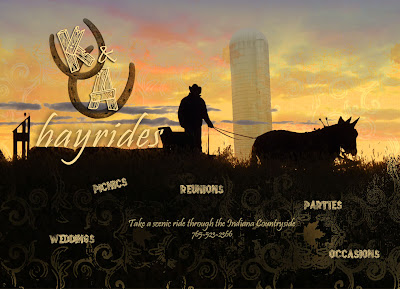So far, I am four classes deep into my plan. I took a class in Excel 2007 this summer, and earned my MOS certification, and a Programming Logic class, as a review to get my feet wet with going back to school at age 60. This fall I am taking two courses, Visual Basic 2008 and Computer Graphics. And I was just thinking, wouldn't it be cool, if every time a student walked into a classroom, one of the walls was a visual map of where they had been so far (in the particular class) and where they were going. And if they helped build it. The map would represent our collective understanding as a class, and remind us that we were each in process of building a similar map in our individual minds. And we could have opportunities in class to discuss our journey with one another.
And wouldn't it be cool, if at least for an hour, we could be involved in a totally immersive process - however minute - so that at the end we emerged feeling like we had really accomplished something. Nobody really knows what works for busy adult learners who are probably trying to do too many things at once and most of whom just don't have the luxury of allowing themselves an immersion experience with their coursework ...
In our Visual Basic Class we are using the text An Introduction to Programming Using Visual Basic 2008 by David L. Schneider. It is scarce on text and chockful of helpful and sometimes really mind-bending little exercises. In fact you really need to do the exercises to get the full benefit of reading the chapter - because author David Sanders is all about "show, don't tell."
So I was just thinking, what if the professor assigned the class two or three progressively more complex or challenging exercises out of the book, say on loops, thusly: two groups of students working an exercise at the board (just to give a visual or reference point), the rest of the students, either in groups, or individually, working it at their computers. I like the idea of small groups because it gives students a chance to talk about it and hopefully clarify their understanding. Then at the end of class, have each student individually work an actual problem from a certification exam to see how they do? And then regroup with students to see how well that worked as a strategy and what suggestions they had.
In today's undergraduate programming courses, one is likely to encounter students who are entirely new to programming and students who are experienced programmers needing to learn a particular programming language - with variations inbetween, say the traditional structured programmer needing to learn OOP. This current situation highlights the importance of also structuring the adult learning experience to allow each student to work within their zone of proximal development. One thing I have observed is that the professor can give the whole class one exercise, but allow each individual some wiggle room within the exercise to play, to explore, and to experiment (enough to keep it manageable, anyway, for both teacher and student). In my experience, students will tend to challenge themselves anyway to varying degrees. Of course review of basic concepts benefits everybody, the new student, as well as the relatively experienced student.
And here's a belated idea for the Programming Logic course I took this summer which used Raptor and JavaScript: Wouldn't it be cool to assign as a class project to write a Google Gadget in JavaScript?
And here's a belated idea for the Programming Logic course I took this summer which used Raptor and JavaScript: Wouldn't it be cool to assign as a class project to write a Google Gadget in JavaScript?
While I'm not a huge fan of behaviorism, it definitely has its benefits in my current situation. Even though I've used earlier versions of Photoshop (more as a hobbyist and to "develop" my digital photographs) and other graphics packages like MacDraw and MacPaint (for drawing flowcharts and other systems-related diagrams) for years and even though I have benefited from the occasional employer workshop offering*, I would still classify myself somewhere in the beginner-intermediate continuum in Photoshop. I have a strong background in the concepts of vector graphics and raster graphics, but, in the case of PhotoShop, no idea how to use many of the tools. Unlike MacPaint, MacDraw, MSPaint, and PhotoDraw, PhotoShop has not been as easy for me to figure out. I think beginner level students in Photoshop might really benefit from opportunities to briefly observe a particular skill, like using the Pen tool, and then to try it out for themselves - and to practice it. Yes, believe it or not, I am talking about short, very specific drill and practice exercises. This would help them to better learn the tool, and to recall how to use it when asked to apply it to more complex assignments. Well, it would benefit me, anyway. So I googled the web for practice exercises and I did find a site called Mike's Sketch Pad that had pen tool practice templates that you could practice drawing.
Just for fun and off-topic, here's a couple of exercises I've done in Photoshop for my class so far:
 |
| Out of the frame effect |
 |
| Product Ad |
Well, on to practice some Visual Basic.
JuneBug
*I worked at a university for 21 years and I think introductory and even more specialized workshops in Photoshop, Fireworks, and Flash should be available to the university community as a whole - as a resource for professors to offer their students, and to take themselves, as well as to university employees. The whole university could benefit from this exchange.



No comments:
Post a Comment